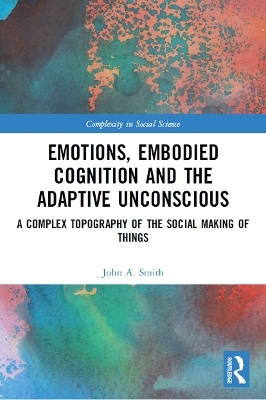
Emotions, Embodied Cognition and the Adaptive Unconscious
Routledge (Verlag)
978-0-367-56838-2 (ISBN)
Emotions, Embodied Cognition and the Adaptive Unconscious argues for the need to consider many other factors, drawn from disciplines such as socio-biology, evolutionary psychology, the study of the emotions, the adaptive unconscious, the senses and conscious deliberation in analysing the complex topography of social action and the making of things.
These factors are taken as ecological conditions that shape the contemporary expression of complex societies, not as constraints on human plasticity. Without ‘foundations’, complex society cannot exist nor less evolve. This is the familiar pairing from complexity theory: path dependency and dynamic emergence. Inter-disciplinary and complexity perspectives need to be incorporated into the social sciences. Routinely, sociologists think of social phenomena as a distinct field, expressed in the term: the ‘social construction of’ without apparent need to refer to other material, biological, psychological, material or ecological conditions or agents.
This book shows how the familiar sociological dynamics of identity, solidarity, differentiation and communication are shaped through the persistent interaction of unconscious and affective processing with conscious deliberation in newly emergent contexts. It is this re-expression, not the surpassing, of human characteristics in contemporary social action that needs to re-inform a complex, ecological approach to the theory and methodologies of the social sciences. The book is intended for a postgraduate/research audience and doctoral students to introduce and synthesise inter-disciplinary contributions to research into complexity theory in the social sciences.
John A. Smith is a writer and artist. He has taught at Goldsmiths, Lancaster and Greenwich universities. His previous books, co-authored with Professor Chris Jenks, Images of Community (2001), Qualitative Complexity (2006) and Sociology and Human Ecology (2018).
Introduction: Basic Concepts, Content and Structure
Part 1. The Legacy of Critical Rationalism: An Attempted Maturity
1. Kant, Nietzshe: Maturity, Genealogy, and Freedom
2. Weber’s ‘Suspended’ Rationalism, Heidegger’s Conservative Turn and Interwar Perspectives in Europe
3. Archaeology, Genealogy, Alterity, Discourse, and Power: The Legacy and Influence of Foucault
4. Postmodernity and Its Discontents: Liquidity and Uncertainty. Castells, Lyotard, and Bauman, on the Landscape of Contested Identity and Performativity
5. Conclusions and Criticisms: The Case for a Complex Topography
Part 2. Alternative Foundations for a Mature Concept of Community
6. Automaticity and the Role of the Adaptive Unconscious
7. The Case for Basic Emotion Theory – Contrasted with Anthropological and Historical Perspectives
8. Towards an Ecology of the Senses
9. Evolutionary Psychology
10. Selective, Serial, and Parallel Processing in Theories of Adaptive Cognition
11. An Ecological Approach to Representation and Language
12. Concluding Remarks to Part 2
Part 3. Constants and Dynamics in Complex Social Expression
13. The Social as a Theatre of the Unconscious, Preconscious, and Conscious Assessment and Deliberation
14. Basic, Developmental, and Constructivist Theories of Affect and Consciousness
15. Auto-exo-reference: Representation and Language in Mediated Relation to an Environment and the Processes of Self-reference
16. Forms of Solidarity: The Topology of Power and Its Affective and Cognitive Consequences
17. The Dynamics of Conservatism and Liberalism: A Contested Common Moral Ground
18. A Post-humanist Epilogue: The Making of Things; The Complex Topography of Agency
| Erscheinungsdatum | 21.04.2022 |
|---|---|
| Reihe/Serie | Complexity in Social Science |
| Verlagsort | London |
| Sprache | englisch |
| Maße | 156 x 234 mm |
| Gewicht | 353 g |
| Themenwelt | Geisteswissenschaften ► Psychologie ► Allgemeine Psychologie |
| ISBN-10 | 0-367-56838-1 / 0367568381 |
| ISBN-13 | 978-0-367-56838-2 / 9780367568382 |
| Zustand | Neuware |
| Haben Sie eine Frage zum Produkt? |
aus dem Bereich


